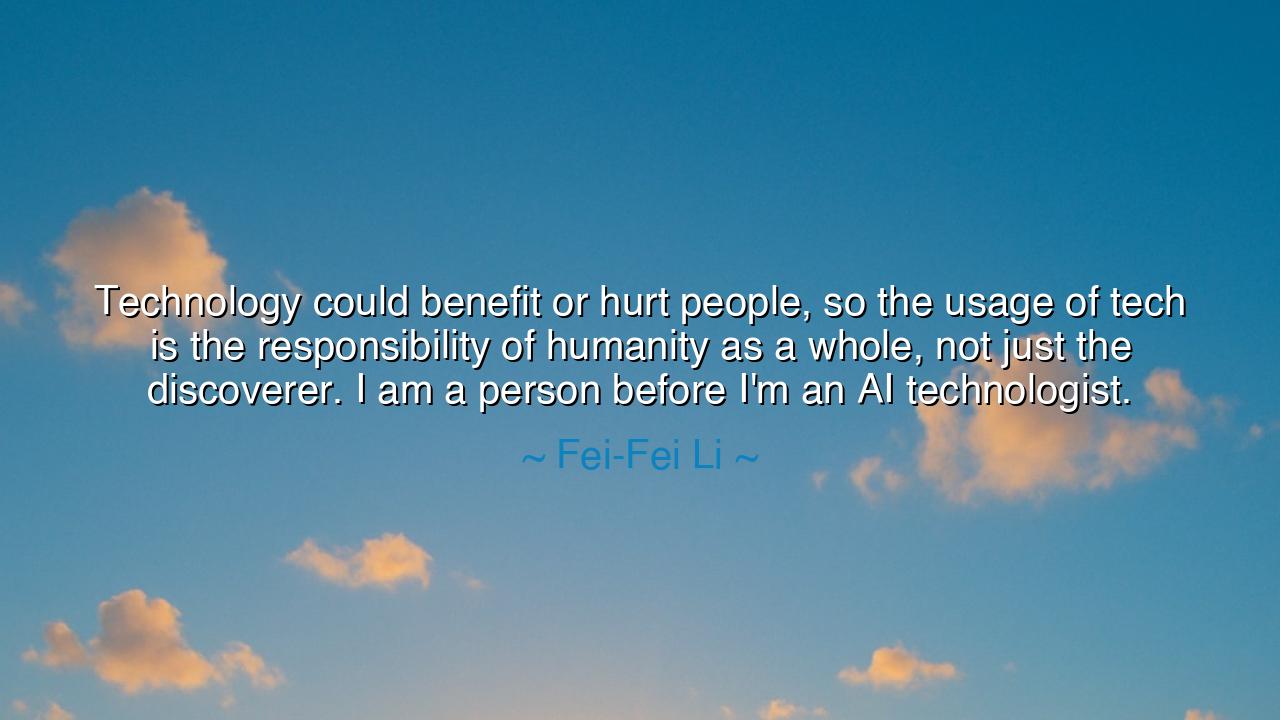
Technology could benefit or hurt people, so the usage of tech is
Technology could benefit or hurt people, so the usage of tech is the responsibility of humanity as a whole, not just the discoverer. I am a person before I'm an AI technologist.






Hear the voice of Fei-Fei Li, a pioneer in the realm of artificial intelligence, who reminds the world that before the engineer, before the inventor, there stands the human being. She declared: “Technology could benefit or hurt people, so the usage of tech is the responsibility of humanity as a whole, not just the discoverer. I am a person before I’m an AI technologist.” These words carry the weight of wisdom, for they pierce through the illusions of progress and demand that we remember the soul behind the machine.
Her declaration springs from the reality that technology is never neutral in its effects—it is shaped by the hands and hearts that wield it. Just as fire can warm the home or burn the village, so too can algorithms, engines, and circuits heal or destroy. Fei-Fei Li speaks from the crucible of experience, having helped birth advances in artificial vision and deep learning, yet she warns with humility: the tool’s destiny belongs not to the discoverer alone, but to all humanity. The moral burden is collective, for every invention touches the lives of the many, not merely the one.
History confirms her wisdom. Consider the tale of Alfred Nobel, who created dynamite to aid in construction and the building of civilization. Yet when his invention was turned to war, his heart was pierced by the misuse of his creation. He resolved to dedicate his fortune to the Nobel Prizes, ensuring that future generations would remember not merely the blast of destruction but the light of peace and discovery. Like Nobel, Fei-Fei Li reminds us that the measure of technology is not only in the brilliance of its design but in the spirit of its application.
So too in our age, we see how AI—born to recognize patterns, to assist in healing, to expand knowledge—can be misused when driven by greed or hatred. Surveillance can oppress, algorithms can discriminate, machines can deepen injustice. But in the hands of compassion, the same technology can help diagnose illness, translate languages, or aid the blind in perceiving the world. Fei-Fei Li’s words echo like a warning bell: the soul of the user matters more than the brilliance of the code.
The origin of her wisdom lies also in her own humanity. She declares: “I am a person before I am a technologist.” Here lies the heart of the teaching. Too often, men and women lose themselves in titles, in roles, in achievements. They forget that before they are inventors, they are sons and daughters, brothers and sisters, beings of flesh and soul. By reclaiming her identity as human first, Fei-Fei Li sets the order of life aright: technology must serve people, not the other way around.
Let this be a lesson to you, O seekers of knowledge. Do not place blind trust in tools, nor abandon responsibility to inventors alone. Each of us bears the weight of how technology is used, whether as builders, consumers, or leaders. Speak against its misuse. Support its noble applications. Demand justice and compassion in its design and deployment. For only when the many walk together in responsibility can progress remain a blessing, not a curse.
Therefore, engrave this truth upon your heart: technology is powerful, but its morality lies in the hands of humanity. Use it to lift the fallen, not to break them. Use it to connect, not to divide. And above all, remember that you are a person before a profession, a soul before a role, a human before a maker of machines. In this way, the tools of tomorrow may become instruments of life, rather than chains of despair.
Thus I say: cherish your humanity, guard your compassion, and wield your technology with honor. For the inventions of our age will shape not only our future, but the destiny of generations unborn. And only when guided by the eternal truth of responsibility will they shine as blessings, not disasters, upon the earth.






AAdministratorAdministrator
Welcome, honored guests. Please leave a comment, we will respond soon